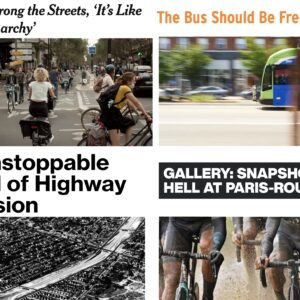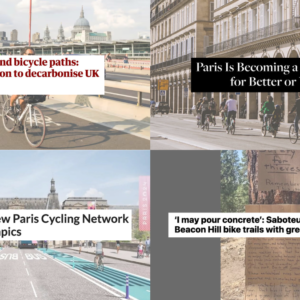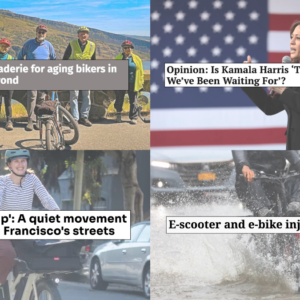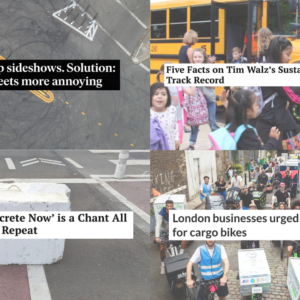Hello everyone. Happy Monday.
Make sure you’ve caught up on all the stories we shared last week. It was a busy news week! Now things will get quiet around here again as I head out on another family trip (this time to visit relatives in Budapest, Hungary). BikePortland will be in vacation mode again from later today (still need to pack!) through September 4th.
And with that, here are the most notable items we came across in the past week or so…
Shifter sabotage: Researchers have found a vulnerability in Shimano’s Di2 electronic shifting system that allows hackers to shift gears of a nearby bike. (Wired)
Super idea: Very pleasantly surprised to see this wonderfully presented breakdown of how American cities could implement superblocks, which would reduce the harms of driving cars that impacts so many of us. (Washington Post)
Move over, e-bike rebates: The City of Chicago’s transportation department has given away over 2,000 bikes as part of a program that distributes them to people in need. Is this a more effective way than e-bike rebates to spur cycling? (Next City)
Power of bicycling: Bicycles are giving young girls in India a level of freedom and access to education that is so profound some call a “silent revolution.” (BBC)
Trains for Harris-Walz: Oregon State Rep Khanh Pham was one of 400 participants in a Zoom call fundraiser for the Democratic presidential ticket that raised $12,000. (Streetsblog USA)
Not just for kids: Turns out that when we get kids back out into streets to play, its often the parents who benefit the most from the new community connections. (The Atlantic)
Culture war on cars: Some Republicans are pushing back on common sense traffic law efforts like automated cameras, right turn bans, and other measures because they feel like it’s just anti-car liberal nonsense. Lol. (Politico)
E-bikes helping vanquish car culture: “The concept of car-lite living is trending around the world,” say authors of a new study about how e-bikes are allowing families to reduce the number of cars they own. (Momentum Magazine)
Watch the Femmes: An absolutely thrilling final stage of the Tour de France Femmes was won by Kasia Niewiadoma by a mere four seconds over Demi Vollering. (Velo)
Road closed for a reason: A bicycle rider in California disobeyed serious warnings about a land slide in Big Sur and tried to climb over it — only to fall 100 feet and suffer injuries before being rescued by authorities. The man now faces several charges. (The Mercury News)
Thanks to everyone who sent in links this week. The Monday Roundup is a community effort, so please feel free to send us any great stories you come across.








Thanks for reading.
BikePortland has served this community with independent community journalism since 2005. We rely on subscriptions from readers like you to survive. Your financial support is vital in keeping this valuable resource alive and well.
Please subscribe today to strengthen and expand our work.
From the Atlantic article:
“In blue cities across the country, local road policy in the past decade has been tweaked in the name of making things safer and more enticing for non-drivers — often by making things slower and more annoying for motorists.
Speed limits have been lowered. Traffic enforcement has been boosted.”
Say what? VERY blue Portland COMPLETELY eliminated our traffic enforcement division for over 2 years and now it is only partially restored.
The answer is right there in your comment. The scope of the Atlantic article is “the past decade.” What you noticed in Portland is just “over 2 years.”
Over the longer time slice, what The Atlantic claimed is largely true for Portland — with the crucial words being “in the name of” rather than, say, “demonstrably.”